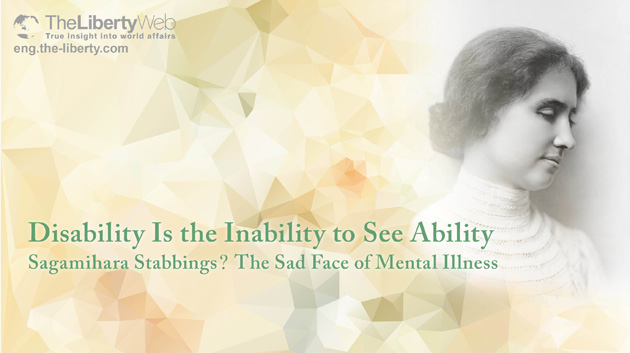Disability Is the Inability to See Ability
Sagamihara Stabbings - The Sad Face of Mental Illness
A care center for disabled people, Tsukui Yamayuri En, in Kanagawa prefecture, became the backdrop of the worst mass killing in Japanese history. The incident prompts us to question our understanding of what it means to be a disabled person.
Suspect Satoshi Uematsu was a former employee of the care facility. In February he sent a letter the chairperson of the care center, a letter suggesting euthanizing disabled patients. He was fired when he continued to make these remarks during work. He was diagnosed with manic disorder and was involuntarily hospitalized, but left in March when doctors assessed that he was no longer a threat to other people.
On the 28th of July, it became clear that during his hospitalization he had said that he had an epiphany of Hitler’s ideology.
Hitler Ideology Behind the Mass Killing
What Uematsu meant by ‘Hitler’s ideology’ is probably the Nazi eugenics that was employed under the aim to make the Germanic master race. Since 1939, around 70,000 disabled persons have been euthanized, which is connected to the Holocaust.
In the letter Uematsu wrote to the chairperson, saying, “we still don’t know the value of a seriously disabled person’s life. Disabled people can only ever create unhappiness.” Seriously disabled people refer to people who have multiple disabilities, both physical and mental. It is true that these people need a lot more nursing care.
The letter revealed that the “nurses’ fatigued faces and caretakers’ lifeless eyes” made him plan the massacre. “Disabled people don’t live as human beings: they live an animal life.”
Many of the disabled patients at the care center were seriously disabled, which made it difficult for them to make conversation, function in traditional manners, not to mention work. Some among them had serious behavioral disorders, and they often would cause physical harm to other people. There naturally arises a question as to the human dignity of these disabled people.
Do Disabled People Have A Personality?
It is difficult to answer this question just by looking at the seriously disabled as they may appear on a cursory glance.
Hiroko Suwa is the director of You Are Angel of Happy Science, a support association for children with disabilities that is based on the idea that the soul is complete regardless of the disability.
She said: “it is without question that disabled people have personalities. They have a mind that can feel everything going on around them; and they can exercise their imagination. Support for children with disabilities takes the role of helping them actualize their thoughts in words. We should not assume the inside is the same as the outside appearance. They are just unable to clearly express their inner abundant world.”
It is commonly accepted that a person’s mental development stops if they are diagnosed with disabilities at a young age. This, however, is untrue.
There was one boy who, at the age of 22 months became unable to move his body freely. The message he typed out at the age of 17 using an impulse system was highly intelligent:
“Mum, sorry for causing you trouble. How did you know that we [disabled people] also have a voice?” “I have always been disappointed that people think we cannot understand them, but I’m very happy that you have realized that I understand you.”
Many patients who use these methods to convey message, start first with words of gratitude to family. This gratitude towards the people around one is something that healthy people can learn from these patients. After knowing this, it is impossible to think that disabled people are a useless nuisance.
Change of Perspective, Change of Actions
When the people around disabled patients change their views, a great many examples show that the patients’ actions change. Suwa said:
“It is not rare for the disabled children who join You Are Angel to undergo miraculous changes such as ending self-injurious actions, becoming able to walk and speak, and learning to write. It isn’t that the children improve; it’s just that the people around them were able to discover these traits that were originally part of the child. It wasn’t the children who changed; it was the perspective of the people around them. When perspective changes, it becomes easier to discover the patient’s inner world.”
If we view the disabled as unintelligent people who cannot understand what we are saying, it wounds their self-respect and we end up providing the wrong kind of ‘support’.
“Rather than thinking that the body is everything, we should think that a soul resides in the body. This is closer to the truth, and as a result the children are able to grow.”
Every Person Is Alive for A Reason
Suwa said that many parents, who first thought that their child’s disability was the greatest unhappiness, were able to change that into the greatest happiness. It is a general misconception that the disabled and their families are unhappy.
How we think of disabled people is something to do with every person in this world. We never know: maybe you or your family may suddenly become disabled due to illness or accident. As we get old, our body weakens, and some of us may suffer from dementia. None of us can live by ourselves.
It is not uncommon for people to question the value of their existence in this world, because they measure their human worth with the measuring rod of a competitive society.
As Chen Guangcheng, a Chinese civil rights activist and self-taught lawyer, blind from an early age, and now residing in the U.S., so wisely espouses, “How a Society Treats Its Disabled is the True Measure of a Civilization.” Disabled people are the champions in this chaotic world, who can show us the true value of love and spiritual salvation.



















